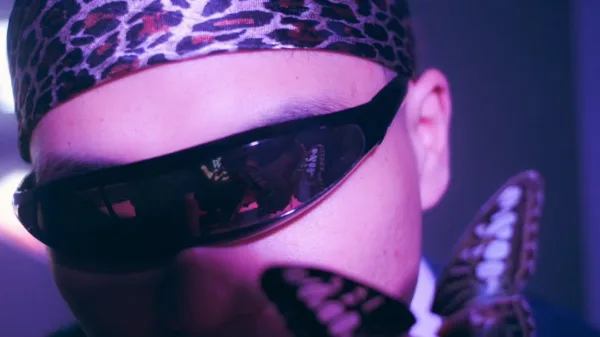After spending a significant amount of time in the music industry, partaking in various writing and event-organizing gigs ,while also performing with Pune-based indie-rock band Coffee For Giraffes, Rushaki found herself dabbling with some of her own material after a while. This ultimately resulted in the birth of her debut experimental-electronica album She Speaks, which she co-produced with Delhi-based singer-songwriter and producer Bharg.
What instantly grabs your attention when you come across the album on any streaming platform is the artwork, which consists of a shadowy portrait of a girl with a small firefly illuminating only a portion of her face. Although not intrinsically proficient at masterful artistry, it perfectly captures the essence of the album that lays down a deeply confessional narrative of the musician’s struggles with mental illness and the pains of growing up.
The record is a 27-minute trip through the intricacies of her mind, entangling you into a web of complicated thoughts and ideas sewed together through glitchy synth lines, chaotic sound effects, idiosyncratic vocal modulations, and other elements. A rather dark take on an essentially electronic album, Rushaki makes sure to blend all her musical influences that she has gathered throughout the years with things she cooked up entirely on her own.
The album kicks off with the brief track titled “chaos (skit)” which is an introductory note from the musician welcoming the audience to her twisted Wonderland. The next song, aptly titled “Begin” commemorates the commencement of the album. Starting with a raindrop-like twinkly intro on the synth, the musician gives a slight glimpse into her tumultuous life filled with substance abuse and impulsive partying. Buoyant and boppy, the track is a reflection of the momentary high that comes along with spontaneity but leads to nothing but more troubles.

In “Easy”, she has incorporated elements like a steady bass line and sampled breathing noises. The latter has been used to accentuate the oncoming dreadful anxiety that eventually consumes her. The song is a sort of affirmation to herself almost acting like a coping mechanism. Weirdly sensual in its soundscape, it carries a sense of urgency that marks the musician’s desperate attempt to get back any semblance of control in her life.
“Icarus” is a retelling of the story of the eponymous mythical character whose pride ultimately led to his downfall. The singer narrates her version of the story, putting herself in place of the character, crooning about “flying high” which ultimately “burns her wings”. Emphasizing mainly on vocals to convey its message, the song uses very minimal instrumental elements – only a simple chord progression on the piano and nominal sound effects.
“Wait Till Tomorrow” carries with it a sense of frolic that starts with a steady intro but swiftly transitions into a dance-y number incorporating funky distorted vocals in the outro. The shift is smooth and gradual without any unnecessary haste which makes you want to slowly move your body to its rhythm.
The album takes a darker turn from this point onward, marked by “sink (Interlude)” which is a minute-long rendition of the singer repeatedly uttering the word “easy” over and over again with the vocals distorting with every loop.
“Devil Kid” is gritty, unhinged, and overwhelming. Marking an acute sense of despondency, the song attempts to rationalize the musician’s internal struggles with overthinking and intrusive thoughts which try to consume her entire being. Her agony is extended towards you to the point where you can almost feel the gruelling vexations that she has to live through on a daily basis.


“All In My Head” kickstarts with a creepy intro that takes us deeper into her spiralling mind, marking an all-time low in the overall mood of the album. The track is deeply existential as Rushaki begins to question her own mind, not sure of her next step. The lyrics are inherently confessional with a minimalistic instrumental-scape backing them up, symbolizing a lack of care that usually comes along with depression.
“Breathe Again” has a heavier intro than most of the other tracks, which takes you by surprise. This is her battle cry as she finally decides to take back her power hoping that this time “her thoughts will lose” and she will emerge victorious. Although her life is still overshadowed by darkness, she is hopeful for a better future where she is finally free from the shackles of her mind.
The record wraps up with “She Speaks” which is a cry for help. The desperation for an escape is a glowing red flag by this point and the need to scream to the world about her pain and agony topples above all else. The song brings the album to an abrupt end, leaving you longing for something more. But that’s the catch here since this is the point where she draws the curtain to her mind limiting any further access to her inner world.
Rushaki’s She Speaks is a reflection of her deteriorating mental state and her struggle to gain back the power she had lost. The record perfectly encapsulates the perils of giving into a blissful high only to come crashing back down twice as harder. When you think of an electronic record, what usually comes to mind are bubbly and colourful soundscapes brimming with good vibes and positivity. The musician’s debut album defies these conventions, adding a darker shade to the pool of electronic music in India, which only speaks for the artist’s potential to bring out music that is vulnerable and touches upon subjects that are usually stigmatized in our society.


























